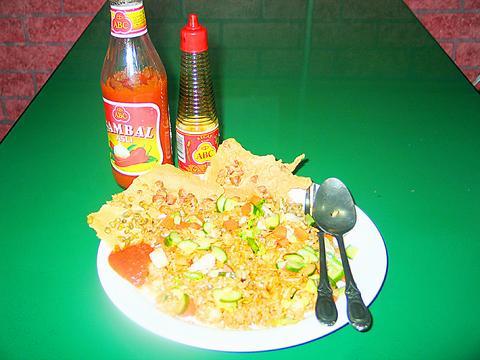Considering the popularity of Southeast Asian foods and the number of Indonesian workers in Taiwan one might expect to see a lot of Indonesian restaurants. In fact there are just a handful and few of these offer authentic Indonesian cuisine. Dede's mini-mart and restaurant fills the void with a small, but tasty selection of Indonesian fare.
An Indonesian-born Chinese, Dede moved to Taiwan four years ago to study Chinese. After having parcels of his favorite snack foods sent from home, he decided to open his own import shop on the second floor of Taipei Railway Station that would cater to the Indonesian community living in Taipei.
After a successful year he seized the opportunity to open a second mini-mart a few doors down from the Taipei Grand Mosque, catering to Taipei's wider Muslim community. This time he included a few tables and a short menu of strict Halal dishes (using only meat butchered by a Muslim).

PHOTO, DIANA FREUNDL, TAIPEI TIMES
The menu, like the surroundings, is simple, with only 11 items to choose from, but the spices used are imported and the cooking is all done by an Indonesian chef. The food can be made spicy or mild depending on individual taste, and if it's not quite spicy enough, there are bottles of sambal hot sauce on every table.
The nasi rendang sapi (beef coconut with rice) and nasi kari ayam (chicken curry with rice) are the most recommended and popular choices among regulars. The remaining options include a few seafood choices and mie (noodle) dishes. There is no vegetarian alternative listed on the menu, but the cook will prepare a enjoyable hot and spicy nasi goring sayur (vegetable fried rice) on request.
Beverages can be brought inside or purchased from the limited selection of tetra-pack juices in the cooler. In addition to all the imported Indonesian nonperishable goods and toiletries there is also an assortment of sweet and savory snack foods available at the front of the shop. The rempeyek (deep fried peanut and bean crackers) and krupuk (shrimp crackers) are great for scooping up your food or for snacking on afterward.
Indojaya Cafe and Mini-market is a no-frills environment and the food is simple, but it's clean, cheap, spicy and tastes great. There's also a KTV in the basement with possibly the largest selection of Indonesian pop songs in Taiwan.

Taiwan has next to no political engagement in Myanmar, either with the ruling military junta nor the dozens of armed groups who’ve in the last five years taken over around two-thirds of the nation’s territory in a sprawling, patchwork civil war. But early last month, the leader of one relatively minor Burmese revolutionary faction, General Nerdah Bomya, who is also an alleged war criminal, made a low key visit to Taipei, where he met with a member of President William Lai’s (賴清德) staff, a retired Taiwanese military official and several academics. “I feel like Taiwan is a good example of

March 2 to March 8 Gunfire rang out along the shore of the frontline island of Lieyu (烈嶼) on a foggy afternoon on March 7, 1987. By the time it was over, about 20 unarmed Vietnamese refugees — men, women, elderly and children — were dead. They were hastily buried, followed by decades of silence. Months later, opposition politicians and journalists tried to uncover what had happened, but conflicting accounts only deepened the confusion. One version suggested that government troops had mistakenly killed their own operatives attempting to return home from Vietnam. The military maintained that the

Before the last section of the round-the-island railway was electrified, one old blue train still chugged back and forth between Pingtung County’s Fangliao (枋寮) and Taitung (台東) stations once a day. It was so slow, was so hot (it had no air conditioning) and covered such a short distance, that the low fare still failed to attract many riders. This relic of the past was finally retired when the South Link Line was fully electrified on Dec. 23, 2020. A wave of nostalgia surrounded the termination of the Ordinary Train service, as these train carriages had been in use for decades

Lori Sepich smoked for years and sometimes skipped taking her blood pressure medicine. But she never thought she’d have a heart attack. The possibility “just wasn’t registering with me,” said the 64-year-old from Memphis, Tennessee, who suffered two of them 13 years apart. She’s far from alone. More than 60 million women in the US live with cardiovascular disease, which includes heart disease as well as stroke, heart failure and atrial fibrillation. And despite the myth that heart attacks mostly strike men, women are vulnerable too. Overall in the US, 1 in 5 women dies of cardiovascular disease each year, 37,000 of them